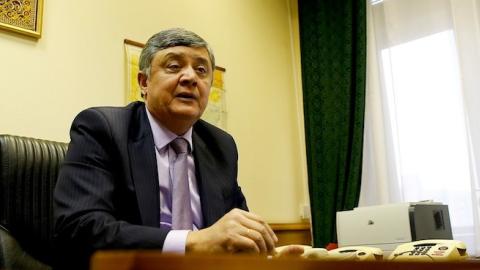Ambassador Zamir Kabulov, currently Russian special envoy to Afghanistan (2011-), was Ambassador to Afghanistan from 2004-2009. Kabulov is a career diplomat specializing in Afghanistan since the late 1970s. He was involved in 1995-96 in talks with the Taliban to help obtain the release of captured Russian pilots.
As Russia’s special representative to Afghanistan, Kabulov was asked to not only deepen Russian-Afghan relations but also help build a peaceful, independent and stable Afghanistan. Kabulov was appointed by President Putin to help find solutions to Afghanistan and advance Russian interests.
However, allowing the Taliban and other Jihadis to survive and grow does not advance Russian interests. Pakistan continues to remain Taliban and Jihad Central. But Ambassador Kabulov seems to have embraced the idea that cajoling Pakistan and giving it what it wants might be the route to success in Afghanistan. He has become Chief Advocate of Pakistan's role in Afghanistan while being Russia's envoy to the region.
Kabulov is doing for Russia what the Obama administration did for the United States: bet on gaining ground in Afghanistan by embracing Pakistan in the hope that would wean Pakistan away from its destructive policies. Amb Kabulov should know that this policy did not work for the US and it will not work for Russia. Unlike the U.S., Russia might not even be able to shower billions of dollars on Pakistan, which still did not change Pakistan's calculus or restrain its ambitions.
Kabulov’s speeches at and interviews on the sidelines of the Heart of Asia summit in Amritsar, provide a window into his thinking. According to Kabulov, Russia after “having tasted hostility with Pakistan” is now trying to come from a different angle, from an angle of friendship and cooperation.” This is because Russian leaders believed they “cannot combat (terrorism) efficiently and productively and eliminate (it) without the cooperation of Pakistan. We need their cooperation and they should realize their importance and responsibility.”
It is almost as if he is saying that the problem with Pakistan lies, not in its policies, but the major powers' inability to make Pakistan realize its "importance and responsibility." Really?
That Amb Kabulov appears to have been swayed by Islamabad’s rhetoric can be seen from the distinction he has repeatedly made between the Taliban who he refers to as a ‘national military-political movement’ and the Islamic State whom he calls a “dangerous” “international organization.” In December 2015, Russia opened a channel with the Taliban as Kabulov believes that the interests of Russia and the Taliban coincide when it comes to ISIS. That the specter of ISIS in Afghanistan may have been exaggerated by Pakistan's ISI precisely to encourage such thinking does not seem to have occurred to him, notwithstanding historic patterns pointing in that direction. Was it not exactly the same argument that Pakistan advanced to the Americans in relation to Al-Qaeda and the Taliban?
When asked to comment on Afghan President Ashraf Ghani’s strong statement demanding more action from Pakistan on the issue of terrorism, Kabulov instead said that the Heart of Asia Conference was not the “right place for settling scores between member states.” How identifying the country that most supports terrorists in Asia is "settling scores" is difficult to understand for most observers though apparently not for Ambassador Kabulov.
Kabulov further stated that Russia was “in favor of putting aside bilateral blames because after this blames life will continue and your countries will remain for centuries neighbors and we wish this should be good neighbors. It is interest of Russian federation.” But there were no bilateral blames in Amritsar, only calls on Pakistan by its neighbors to stop supporting terrorism. That Pakistan does so is widely known, including probably to Kabulov.
Kabulov also sought to play down Russian military assistance to Pakistan by stating that the “size of cooperation between Russia and India if you compare with size of cooperation with Pakistan it is many hundred times more. It is one thing. Second, we cannot understand what people say is mild jealousy because India has very close cooperation with United States of America in fields that we used to be the only trusted partner. So have you heard any complaints from Moscow about that?”
The flaw in that reasoning is that Kabulov views the concerns of Afghanistan and India about Pakistan's well documented double dealing --supporting Taliban and Jihadis while promising not to -- as 'jealousy.' That is a superficial approach at best and a dangerous one. Afghanistan and India are not 'jealous' that Russia is building ties with Pakistan to hedge against India drawing closer to US. They are worried that Russia will contribute to Pakistan's Jihadi fantasies even if only inadvertently and unintentionally at a time when the US is becoming more aware of Pakistan's tendency to run with the hare and hunt with the hound on the issue of terrorism.
Instead of being dismissive about real concerns about Pakistani behavior, Russia's ambassador should heed them. If billions of dollars in US aid did not change Pakistani behavior, how does Kabulov expect to change it just with sweet talk at conferences and in media interviews?
















